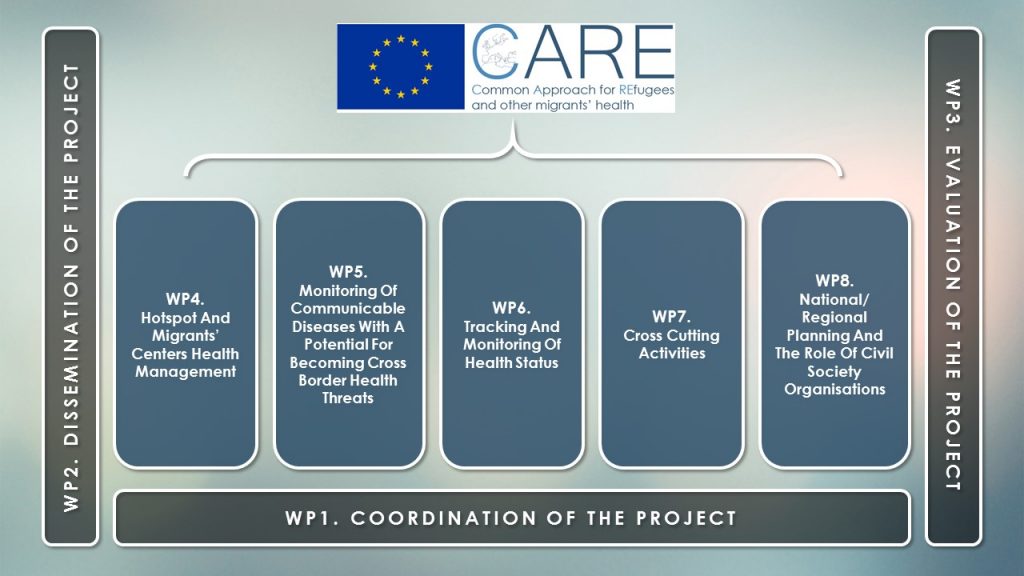The project “CARE – Common Approach for REfugees and other migrants’ health”, which has received funding from the European Union’s Health Programme (2014-2020), aimed to promote a better understanding of refugees and migrants’ health condition as well as to support the adaptation of the appropriate clinical attitude towards refugees and migrants’ health needs and in particular towards the health needs of fragile subgroups, such as minors, pregnant women and victims of violence.
Participating countries were those facing the greatest burden of the migration crisis at the time. In fact, they were either in the middle of the Mediterranean sea (Italy, Greece, Malta) or on the Balcanian route of refugees/migrants, and their policy and actions had clearly the highest impact also on neighboring Countries, depending on the actual ability to take care of the arrivals or at least to reduce and manage such an impact.
The CARE project was designed and implemented in close cooperation with the national and local authorities of the involved Countries and was also coordinated with the ongoing activities for the migrant population, where already existing, in order to complement them and to introduce added values of EU cooperation, increased use of multidisciplinary approaches and improvements in the monitoring of activities and potential health risks.
Its main results included more appropriate health care deliveries, increased control of infectious disease risk at the early phase of migrant’s care and better taking care of migrants’ health over the European territory will have been obtained.
Overall, the CARE project focused on promoting and sustaining the good health of migrants and populations in Member States experiencing strong migration pressure. More specifically, the CARE project met the following operational objectives:
- Sustain the establishment of a multidisciplinary team in Hotspots and migrant’s Centres, in Italy, Greece and Croatia as well as promote appropriate healthcare provision to migrants and tackle health threats into the target Centres
- Ensure the rapid detection of disease outbreaks and potential public health emergencies occurring in hotspot/reception centers, contribute to prevent cross border health threats, assess the current policy in vaccination offer targeting newly arrived migrants, and provide information on endemic and currently epidemic diseases in the countries of origin and transit of newly arrived migrants to front line health care workers in order to complement the individual health assessment
- Realize a prototype of an integrated system for tracking and monitoring the health status of migrants/refugees at the moment of their arrival, based on advanced technology (smart devices and tags)
- Raise knowledge and awareness in general public with regard to “true” and “false” health topics about migrants and refugees
- Empower health professionals and non-health personnel (social workers, cultural mediators, volunteers, law enforcement operators, etc.) working outside Hotspots and other migrants’ Centres, to meet the needs of migrants at their first arrival, during their move and over their stay in the target MSs, considering also children and adolescent needs
- Promote migrants health literacy with emphasis on the right to access public health care services in MSs aiming to facilitate delivery of services to migrants, according to their age
- Support the development of integrated Public Health plans, relevant to migrants and refugees, based on: the synergies and complementarities between Public sector and civil society organizations; good practices and evidence based interventions
The CARE project, which counted upon the endorsement of European governments experiencing strong migration flows, deployed its potential throughout 8 Work Packages (WPs), all tailored to address different aspects of migrant’s health, with a view to hosting societies. Among them, three WPs were cross-cutting, namely coordination, results dissemination and evaluation. Other WPs focused on sustaining the health of migrants within the hotspots and migrants’ centres, producing evidence based instruments to manage health threats and syndromic surveillance, offering a way for tracking migrant’s health on the move, producing training and information material for health staff, general public and migrants as well as intervene into the public/private relationships to promote a new governance model for migration public policies. The project was articulated into eight work packages represented in the image below.

